This research was initially presented during the poster sessions of the Communicating Astronomy with the Public virtual conference 2021.
Perth Astrofest: A high impact astronomy festival
- Kirsten Gottschalk, Astronomy Ambassador, ICRAR
- Dr Miriam Sullivan, Science Communication Researcher, Curtin University
Perth Astrofest is the largest astronomy event in Western Australia, and is a key focus for the local astronomy community each year. Since the first event in 2009 for the International Year of Astronomy, Astrofest has been held annually since 2011, and routinely attracts over 4,000 attendees, mostly from the surrounding Perth area.
Astrofest is in initiative of the Astronomy WA collective, a non-incorporated body with representatives from the majority of Astronomy research, amateur, outreach, tourism and education organisations in Western Australia. Core funding to hold Astrofest each year comes from a group of key partners (Curtin University, the International Centre for Radio Astronomy Research (ICRAR), Scitech and CSIRO) with other sponsorship (both cash and in-kind contributions) coming from a wide variety of separate parties.
Astrofest aims to:
- Inspire interest and participation in science;
- Increase awareness of local astronomy;
- Reconnect the local community with the night sky; and
- Provide a fun, free, family orientated event for all.
Rationale
Astrofest relies heavily on external funding, so it’s important that we can demonstrate impact to our external stakeholders. We were also interested in finding out more about the attendees and how we could improve the event. A common critique of Science Festivals and lots of science communication efforts is that they only attract scientists and people who are already interested in science, we’re ‘preaching to the converted’. We were interested in exploring that idea and finding out if it was true for Astrofest.
Methodology
Attendees were asked to complete a survey about the event before they left. There was a bank of iPads, with staff to assist, and after completing the survey you were entered into a draw to win different prizes, including a telescope.
ASTROFEST 2020 FEEDBACK SURVEY (PDF)
Results and discussion
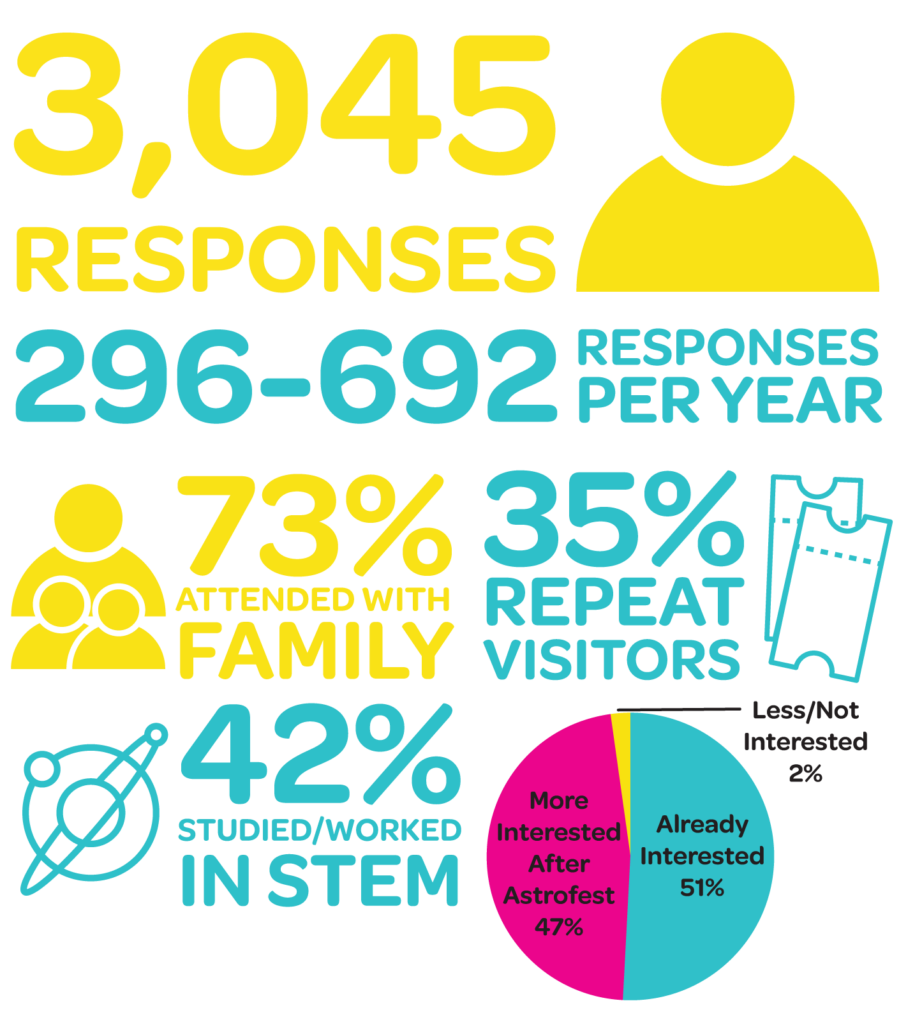
The survey was run over seven years from 2014 to 2020 with 3,045 eligible responses. Most of our survey participants attended Astrofest with their family and about a third were repeat visitors. About 40% had previously studied or worked in a STEM related field.
About half stated that they were already interested in astronomy before attending Astrofest, 47% said they were more interested after Astrofest, and the remaining 2% of participants were either not interested and Astrofest didn’t change that, or less interested in Astronomy after Astrofest.
The most popular attraction at Astrofest was the telescopes – even in years when it rained or was cloudy. Science shows were the next most popular, which are run by our local science centre Scitech and targeted at children. Interestingly, there wasn’t really any differences in what people attended and picked as their favourite event based on their interest in astronomy. Participants with a background in science were slightly more likely to say they enjoyed the passive exhibits, such as the astrophotography and models of the Australian SKA site.
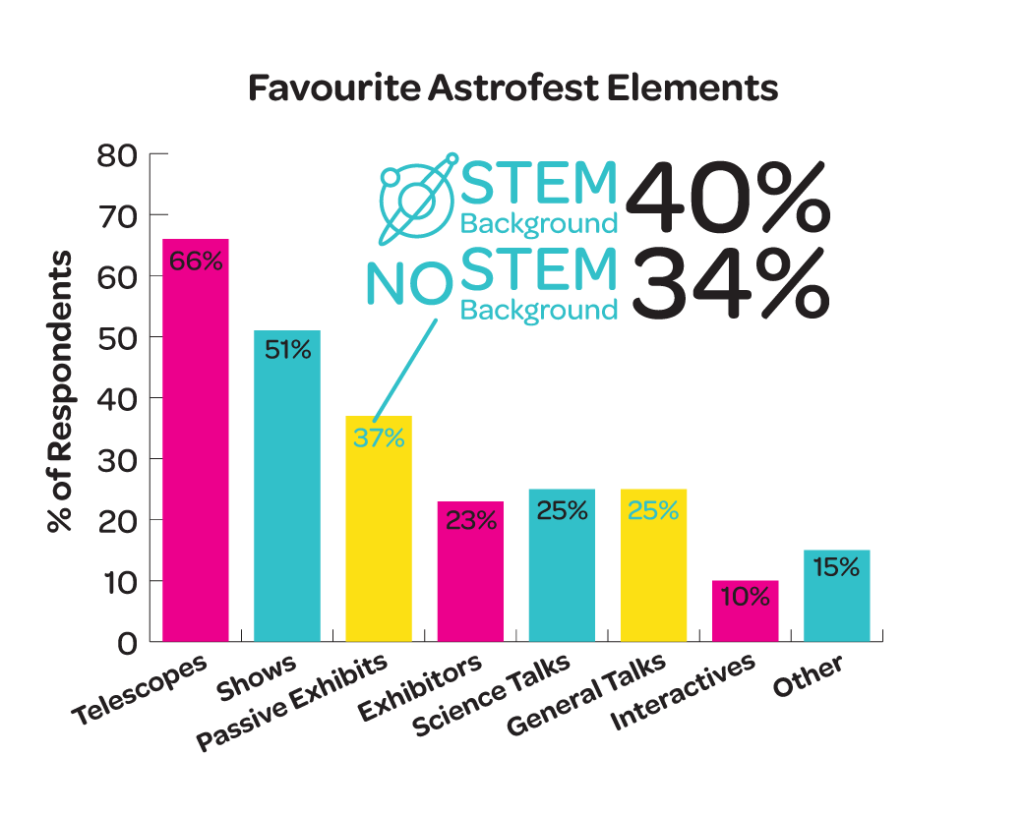
Participants were asked to complete a likert scale questionnaire on how Astrofest impacted their attitudes. As you can see, there was extremely high agreement across the board. Astrofest made our participants feel more inspired, interested, confident, and eager to find out more. Most found it relevant and a good learning experience, and they agreed that it changed the way they think about astronomy.
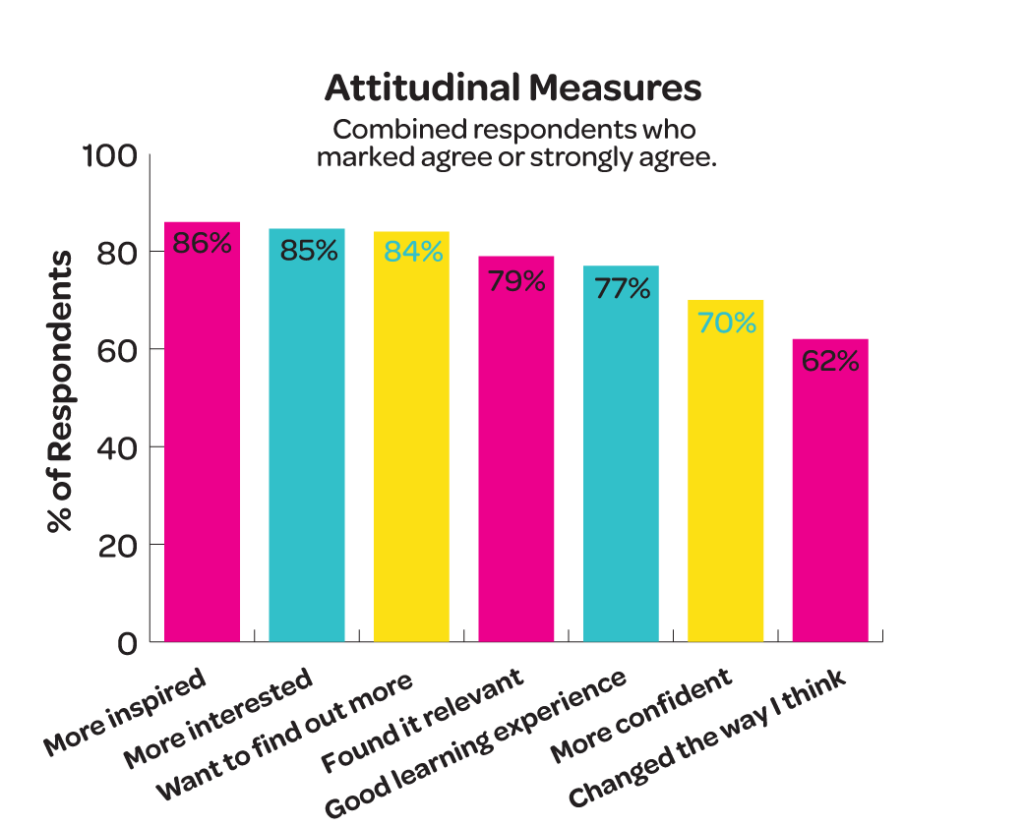
These were the measures where we expected to see the most difference with our ‘astronomy converted’ group. But actually there was very little difference. People who said they were already interested were slightly more likely to STRONGLY agree it was relevant and more likely to stay neutral on whether it changed the way they think- but as you can see there is overall still good agreement.
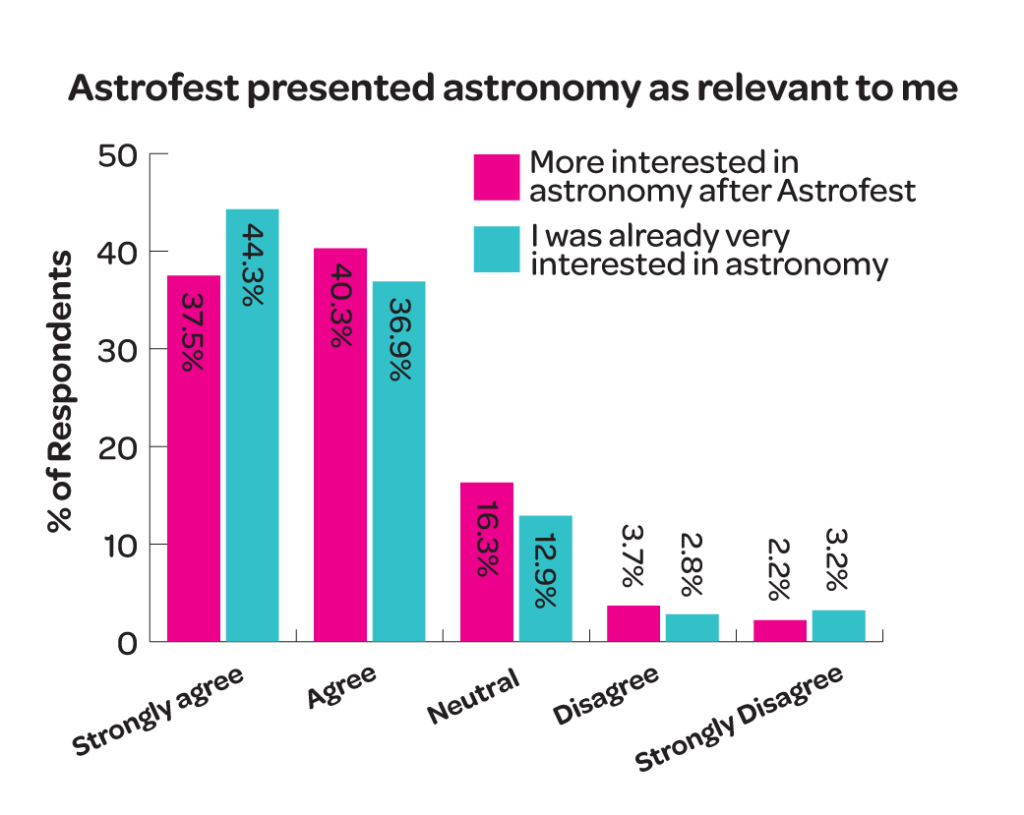
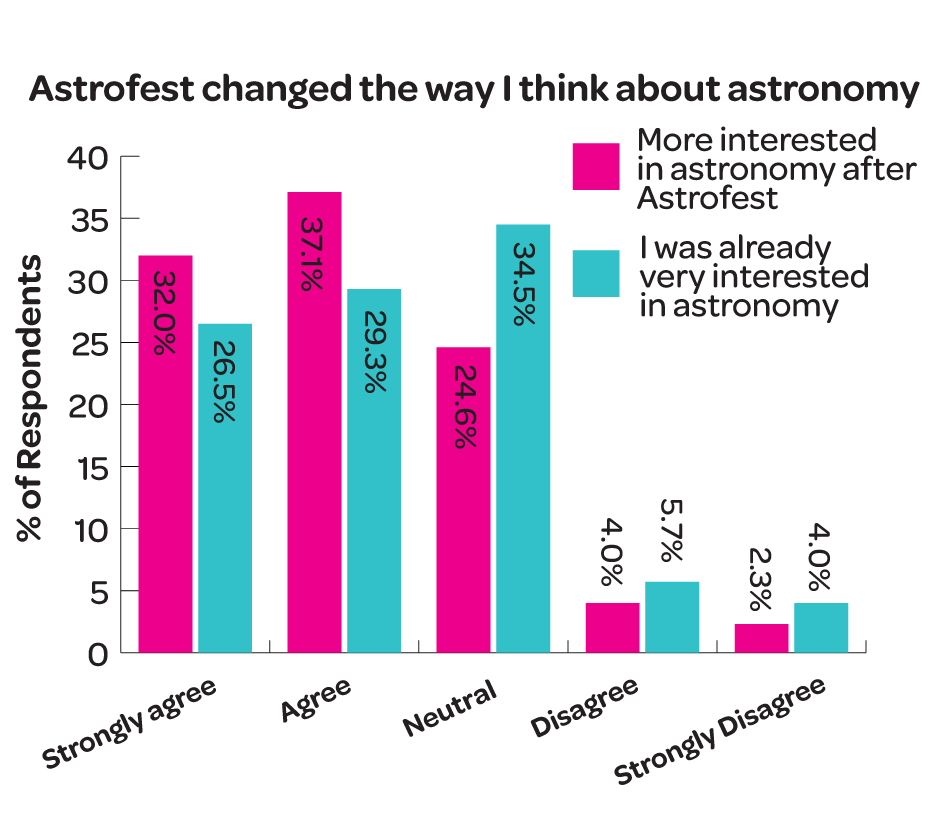
Participants nominated follow-up activities that they intended to do after Astrofest, with the most popular options being telling others about the night sky, searching for astronomy information online and visiting an observatory. These activities were all similarly popular between our groups, except attending an astronomy talk and speaking to others about the night sky were slightly more preferred by visitors with a pre-existing interest in astronomy or background in science.
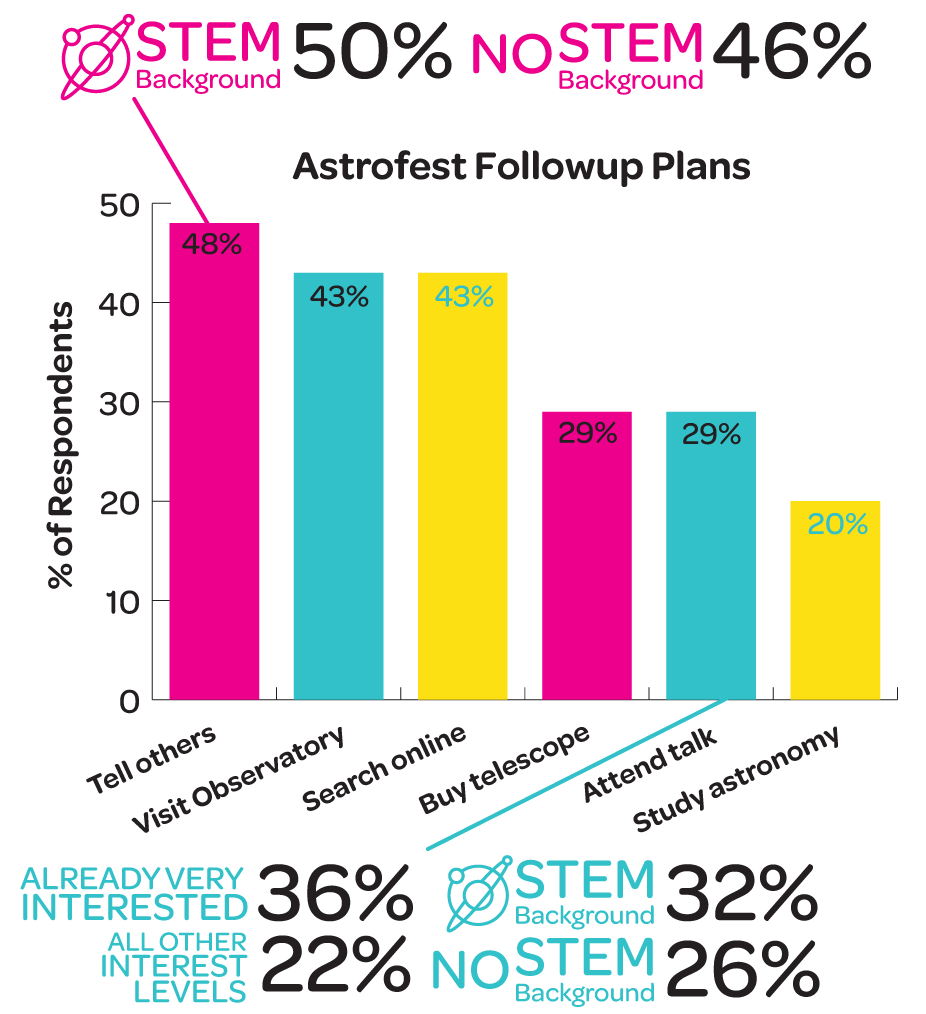
Although these are intentions, not behaviours, the impact on the broader community suggests people are following through with their commitment.
We are told that sales and enquiries at local telescope shops increase dramatically following the event, and local outreach observatory tour bookings increase in following months. There is also the broader impact of the travelling astrophotography exhibition across regional Western Australia, reaching more geographically isolated audiences throughout the following year.
conclusions
So, how can this work help with your next astronomy event? Is it worth holding an astronomy event even if you’re only attracting those already interested in astronomy?
Our answer here is emphatically, YES. We’ve found that even for those with a background in science or who already listed their interest level in astronomy as high, Astrofest still had impact on their views of astronomy, and they still felt that Astrofest presented astronomy as relevant to them.
Events like Astrofest can create even stronger advocates for astronomy amongst those that are already interested and are a good method to engage an interested audience with current projects and work within astronomy. Astrofest also increased the interest level amongst the rest of the audience, so this style of event has some impact on both the ‘converted’ and the ‘un-converted’ alike.